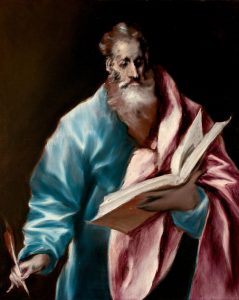Thoughts on the Lessons for Sept. 21, 2025 (Feast of St. Matthew)

Apostle Saint Matthew (1610-1614), oil painting on canvas by El Greco (1541-1614). El Greco Museum, Toledo, Spain. (Click image to enlarge.)
First Reading: Proverbs 3:1-6
As a church named in honor of St. Matthew, the apostle and evangelist, we celebrate the Feast of St. Matthew this Sunday. The readings chosen for this day reflect the tradition of Matthew as a tax collector who left that despised position to follow Jesus. In our first reading, the Book of Proverbs invites us to keep God’s commandments and use them to guide our lives. If we do so, Proverbs assures us, we will be amply rewarded with a good life and good reputation.
Psalm: Psalm 119:33-40
The Psalmist’s message, a brief snippet drawn from the longest of all the psalms, echoes the Proverbs reading: Learn God’s laws and commandments and follow them faithfully. God’s way turns us away from what is worthless, we sing: God’s way gives life. In words that might speak to Matthew’s call, the Psalmist prays, “Turn my eyes from watching what is worthless; give me life in your ways. … Turn away the reproach which I dread, your judgments are good.”
Second Reading: 2 Timothy 3:14-17
The second letter of Timothy, one of several short pastoral epistles written by later followers in Paul’s name, offers guidance to a growing church. It mirrors the Psalmist’s call for unity in tradition, guided by Scripture. As you read or hear it, though, bear in mind that when it was written in the late first century or early second, the New Testament was not yet assembled into a book, and the Gospels had only recently been written down. “Scripture” meant the Hebrew Bible, centered on Torah’s command to love God, love our neighbor, and care for the poor and the alien. The New Testament, still to come, would begin with the Gospel written in Matthew’s name.
Gospel: Matthew 9:9-19
Jesus had a reputation for hanging out with sinners, outcasts, and people the authorities considered deeply suspicious: Prostitutes, drunks, and lepers; women, foreigners, and maybe worst of all, tax collectors, those despised collaborators who extracted the Roman Empire’s taxes from their neighbors. People like Matthew. Despite his outcast status as a tax collector, though, when Jesus called, Matthew followed him without question … and invited Jesus and his friends home for dinner. “I desire mercy, not sacrifice,” Jesus told the Pharisees. “For I have come to call not the righteous but sinners.”
